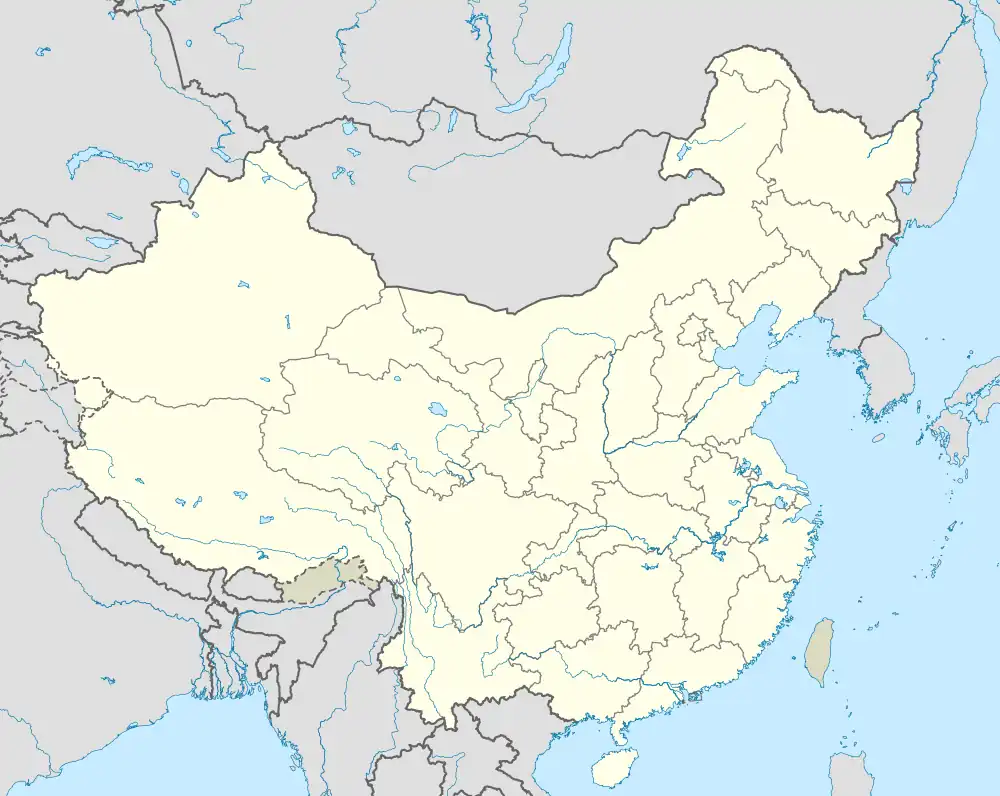Wen'anyi
Wen'anyi (simplified Chinese: 文安驿镇; traditional Chinese: 文安驛鎮; pinyin: Wén'ānyì Zhèn) is a town in Yanchuan County, Yan'an, Shaanxi, China.[2] The town is located in central Yanchuan County, 15 kilometres (9.3 mi) from the county center of Dayu Subdistrict.[3] The town spans an area of 325.72 square kilometres (125.76 sq mi), and has a hukou population of 22,098 as of 2018.[1]
Wen'anyi
文安驿镇 | |
|---|---|
![A yaodong in Liangjiahe Village [zh]](../I/%E6%A2%81%E5%AE%B6%E6%B2%B3%E7%BA%A2%E8%89%B2%E6%95%99%E8%82%B2_11.jpg.webp) A yaodong in Liangjiahe Village | |
 Wen'anyi | |
| Coordinates: 36°51′57″N 110°03′19″E | |
| Country | China |
| Province | Shaanxi |
| Prefecture-level city | Yan'an |
| County | Yanchuan County |
| Area | |
| • Total | 325.72 km2 (125.76 sq mi) |
| Population (2018)[1] | |
| • Total | 22,098 |
| • Density | 68/km2 (180/sq mi) |
History
In 1958, Wen'anyi was established as a people's commune.[3] Xi Jinping was sent to Liangjiahe Village in Wen'anyi in early 1969 as part of Mao Zedong's Down to the Countryside Movement.[4] Xi stayed in the village for seven years, performing manual labor and ascending the local political ranks.[4] In May 1984, Wen'anyi was changed to a township, and in August, it was upgraded to a town.[3] In 2015, the former town of Yujun was merged into Wen'anyi.[5]
Administrative divisions
Wen'anyi administers 2 residential communities and 23 administrative villages.[6]
Residential Communities
Wen'anyi contains the following 2 residential communities:[6]
Villages
Wen'anyi contains the following 23 administrative villages:[6]
- Shangyi Village (Chinese: 上驿村)
- Xiayi Village (Chinese: 下驿村)
- Majiagou Village (Chinese: 马家沟村)
- Yiluohe Village (Chinese: 依洛河村)
- Liangjiahe Village (Chinese: 梁家河村)
- Baijiayuan Village (Chinese: 白家塬村)
- Yujun Village (Chinese: 禹居村)
- Laozhuanghe Village (Chinese: 老庄河村)
- Tuojiacha Village (Chinese: 驮家岔村)
- Lüjiahe Village (Chinese: 吕家河村)
- Qiaojiahe Village (Chinese: 乔家河村)
- Kangjia Village (Chinese: 康家村)
- Fengjiawan Village (Chinese: 封家湾村)
- Gaojiaping Village (Chinese: 高家坪村)
- Zhangjiatun Village (Chinese: 张家屯村)
- Majiaping Village (Chinese: 马家坪村)
- Gaojiagetu Village (Chinese: 高家圪图村)
- Fanjiagou Village (Chinese: 樊家沟村)
- Haojiahe Village (Chinese: 郝家河村)
- Donggeta Village (Chinese: 东圪塔村)
- Hejiahe Village (Chinese: 贺家河村)
- Dumuyuan Village (Chinese: 杜木塬村)
- Poshihe Village (Chinese: 坡石河村)
Demographics
Wen'anyi has a hukou population of 22,098 as of 2018.[1]
Prior to the merger of Yujun into Wen'anyi, Wen'anyi's population per the 2010 Chinese Census was 4,178, down from the 5,474 recorded in the 2000 Chinese Census.[5]
A 1996 population estimate put Wen'anyi's population at 7,000.[3]
Economy
Liangjiahe Village has become a major red tourism site, due to Xi Jinping's years living in the village.[4] According to the People's Daily, about 2,500 people come to visit the village each year.[4] A publication by the government of Yanchuan County reported that Wen'anyi spent 73 million renminbi in 2017 on infrastructure and beautification to further develop tourism.[7]
Transport
National Highway 210 runs through Wen'anyi.[3]
References
- 中国县域统计年鉴·2019(乡镇卷) (in Chinese). Beijing: 中国统计出版社, 国家统计局农村社会经济调查司. May 2020. p. 616. ISBN 9787503791390.
- 2020年统计用区划代码(延川县) [2020 Statistical Division Codes (Yanchuan County)] (in Chinese). National Bureau of Statistics of China. 2020. Archived from the original on 2021-06-03. Retrieved 2021-08-29.
- 文安驿镇 [Wen'anyi]. xzqh.org (in Chinese). 2012-03-21. Archived from the original on 2021-07-26. Retrieved 2021-08-29.
- Buckley, Chris (2017-10-08). "Chinese Village Where Xi Jinping Fled Is Now a Monument to His Power". The New York Times. ISSN 0362-4331. Archived from the original on 2021-07-18. Retrieved 2021-08-29.
- 延川县历史沿革 [Yanchuan County Organizational History]. xzqh.org (in Chinese). 2015-06-30. Archived from the original on 2021-07-26. Retrieved 2021-08-29.
- 2020年统计用区划代码和城乡划分代码(文安驿镇) [2020 Statistical Division Codes and Urban-Rural Division Codes (Wen'anyi)] (in Chinese). National Bureau of Statistics of China. 2020. Archived from the original on 2020-12-11. Retrieved 2021-08-29.
- 社会经济 [Society and Economy] (in Chinese). Yanchuan County People's Government. 2018-05-25. Archived from the original on 2018-10-14. Retrieved 2021-08-29.